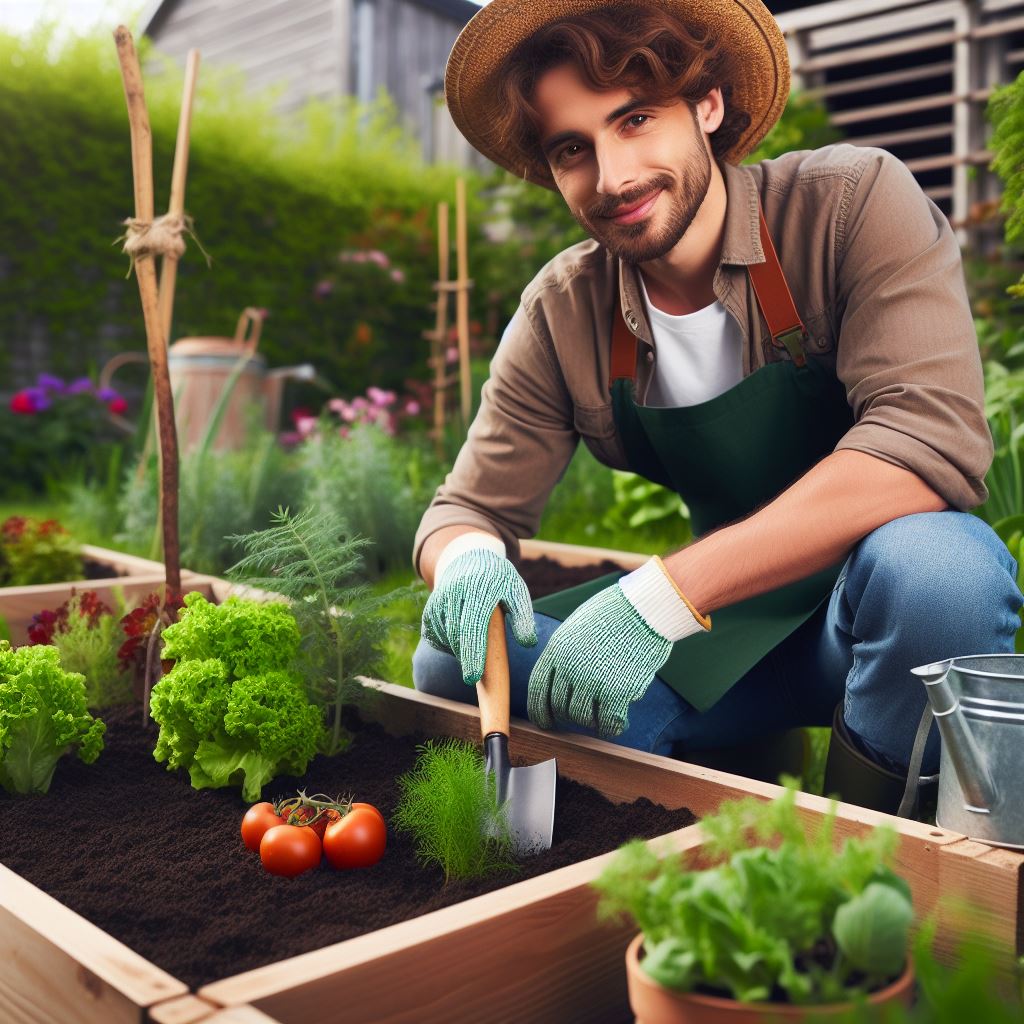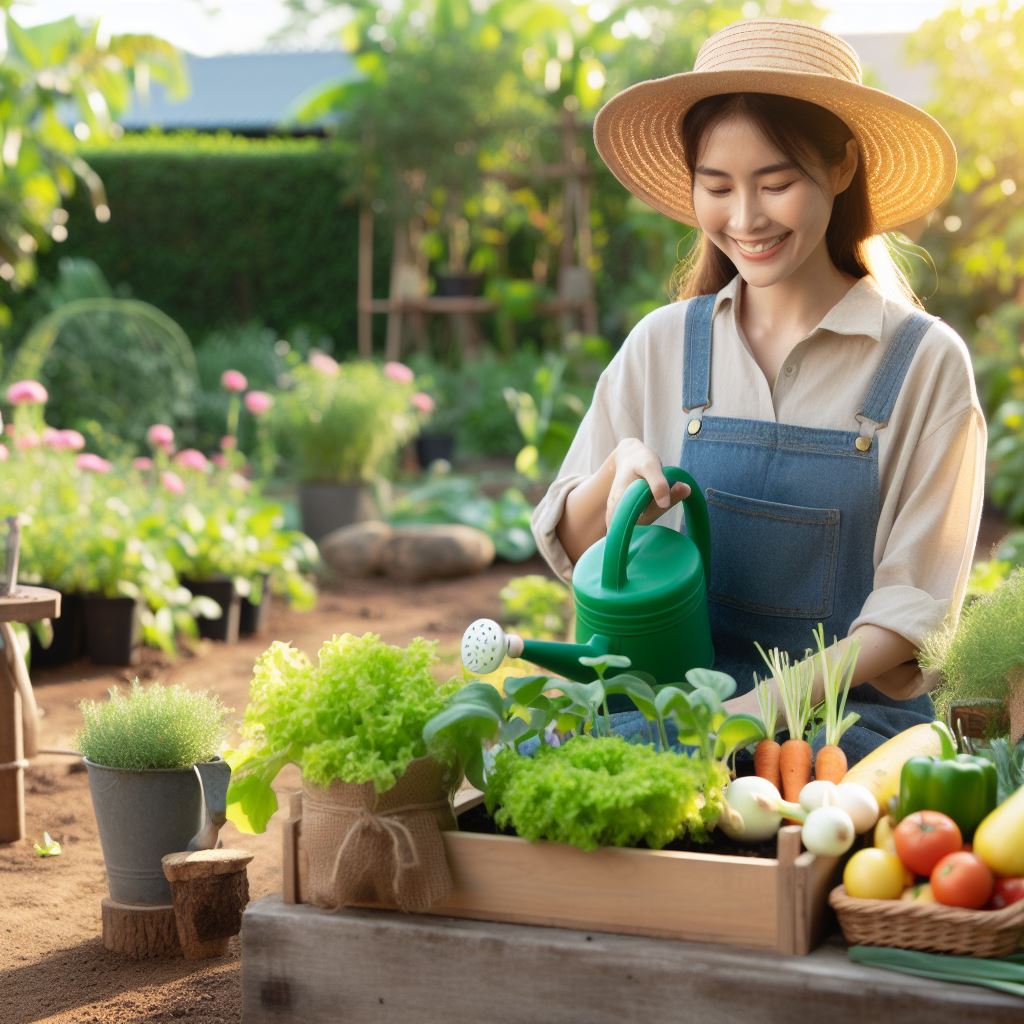Introduction
Organic methods are essential in small-scale gardens for their environmental benefits and health advantages.
A. Importance of organic methods in small-scale gardens
Organic methods are crucial in small-scale gardens for several reasons.
Firstly, they promote soil health and biodiversity, enhancing the overall ecosystem of the garden.
Secondly, they reduce chemical runoff, preventing pollution of water sources.
Thirdly, organic gardening produces healthier, more nutritious crops without synthetic pesticides or fertilizers.
Finally, it encourages sustainable practices, ensuring long-term viability for both the garden and the environment.
Organic gardening is a practice that promotes natural processes and avoids synthetic chemicals.
By prioritizing soil health, biodiversity, and sustainability, organic gardening aims to create a balanced ecosystem.
B. Organic gardening and its principles
Organic gardening is a method of cultivating plants without synthetic chemicals or genetically modified organisms (GMOs).
Its principles emphasize soil health, biodiversity, and ecological balance.
Practices include composting, crop rotation, companion planting, and natural pest control methods.
By nurturing soil fertility and working in harmony with nature, organic gardening aims to produce healthy, sustainable food while minimizing environmental impact.
Benefits of Organic Methods for Small-Scale Gardens
When it comes to small-scale gardens, opting for organic methods brings numerous benefits that cannot be ignored.
From healthier and safer produce to the protection of the environment and wildlife, organic gardening practices provide a cost-effective and sustainable approach for gardeners of all levels.
A. Healthier and Safer Produce
Organic gardening methods prioritize the use of natural techniques and materials.
Transform Your Agribusiness
Unlock your farm's potential with expert advice tailored to your needs. Get actionable steps that drive real results.
Get StartedBy avoiding synthetic chemicals and pesticides, organic gardeners can ensure that the produce they grow is free from harmful residues.
This results in healthier and safer food options for individuals and their families.
Furthermore, organic gardening encourages biodiversity and enhances the nutritional value of the produce.
By incorporating composting, crop rotation, and beneficial insects, gardeners can maintain a balanced ecosystem in their small-scale gardens and produce crops with higher nutrient levels and better flavor.
B. Protection of the Environment and Wildlife
Organic methods prioritize the conservation of the environment and the protection of wildlife.
Traditional agriculture often involves the use of synthetic fertilizers and pesticides that can contaminate soil, water sources, and negatively impact biodiversity.
By using organic methods, gardeners can help reduce water pollution, conserve natural resources, and protect beneficial insects and animals.
Avoiding harmful chemicals also promotes a healthier ecosystem, preserving the balance and harmony of nature within small-scale garden environments.
C. Cost-Effectiveness and Long-Term Sustainability
Organic gardening methods prove to be cost-effective and sustainable in the long run.
While initially, organic fertilizers and pest control methods may seem more expensive, they are ultimately an investment that eliminates the need for continuously purchasing synthetic products.
By implementing composting, rainwater harvesting, and utilizing natural pest control solutions, organic gardeners reduce their reliance on external resources.
This leads to lower operational costs, making organic gardening a financially viable choice for small-scale gardeners.
Moreover, organic practices promote soil health and fertility, reducing the need for expensive amendments or fertilizers in the long term.
Organic methods also contribute to the sustainability of gardening practices.
By avoiding synthetic inputs, gardeners help minimize their carbon footprint and promote a more eco-friendly approach to cultivation.
This not only benefits the immediate garden environment but also contributes to broader efforts in creating a more sustainable agricultural system.
In general, embracing organic methods in small-scale gardens offers a multitude of benefits including healthier produce, environmental protection, and long-term sustainability.
By choosing organic practices, gardeners can enjoy the peace of mind that comes from consuming safe and pesticide-free food while contributing to the preservation of the environment and wildlife.
Additionally, the cost-effectiveness and long-term sustainability of organic gardening make it an ideal choice for individuals looking to create a thriving garden that promotes a healthier planet.
Essential Soil Management Techniques
A. Importance of Soil Health in Organic Gardening
- Soil health is crucial in organic gardening as it directly affects the growth and productivity of plants.
- Healthy soil provides essential nutrients, supports beneficial soil organisms, and improves water retention.
- By focusing on soil health, organic gardeners can create a sustainable and thriving garden ecosystem.
B. Composting and Its Role in Enriching the Soil
- Composting is a natural process where organic matter breaks down to create nutrient-rich humus.
- It helps improve soil structure, fertility, and increases its ability to hold moisture.
- Organic gardeners can make compost by combining kitchen scraps, yard waste, and other organic materials.
- Adding compost to the soil enhances its nutrient content, promoting healthy plant growth and reducing the need for synthetic fertilizers.
C. Mulching to Conserve Moisture and Prevent Weed Growth
- Mulching is the process of covering the soil surface with a layer of organic material.
- It helps conserve moisture by reducing evaporation, keeping the soil consistently moist.
- Mulch also acts as a natural weed barrier, preventing weed seeds from germinating and competing with plants for nutrients.
- Organic mulch, such as straw, leaves, or wood chips, decomposes over time, adding organic matter to the soil.
- Mulching provides insulation, protecting plant roots from extreme temperature fluctuations.
- Additionally, it helps prevent soil erosion and improves soil structure by preventing compaction.
In essence, implementing essential soil management techniques is vital in organic gardening for a successful and sustainable garden.
By prioritizing soil health, organic gardeners can create a thriving ecosystem that supports plant growth and reduces the need for synthetic inputs.
Composting enriches the soil by providing essential nutrients and improving its overall quality.
Mulching, on the other hand, conserves moisture, prevents weed growth, and enhances soil structure.
Combining these techniques promotes a healthy and productive garden while minimizing environmental impacts.
Showcase Your Farming Business
Publish your professional farming services profile on our blog for a one-time fee of $200 and reach a dedicated audience of farmers and agribusiness owners.
Publish Your ProfileOverall, these practices showcase the importance of soil management in organic gardening, ensuring long-term success and sustainability.
Read: Vertical Gardening: Grow Up, Not Out
Natural Pest Control Methods
A. Companion planting for pest prevention
Interplanting herbs and flowers with vegetables can deter pests.
Marigolds are known to repel nematodes and attract beneficial insects.
Planting garlic, onions, or chives around crops can repel aphids and beetles.
B. Attracting beneficial insects and birds
- Growing plants that provide nectar and pollen attracts bees and other pollinators.
- Ladybugs, lacewings, and praying mantises are natural predators of garden pests.
- Installing bird feeders and birdhouses can attract birds that feed on insects.
C. Use of physical barriers and traps
- Installing fences or netting can protect plants from larger pests like rabbits or deer.
- Sticky traps and pheromone traps can be used to catch flying insect pests.
- Row covers can prevent insects from reaching plants while still allowing sunlight and water in.
D. Homemade organic insecticides and fungicides
- Neem oil is an effective organic insecticide that targets a wide range of pests.
- Soap spray made with water and liquid soap can control aphids and soft-bodied insects.
- Baking soda mixed with water can act as a fungicide for fungal diseases on plants.
- Garlic and hot pepper sprays can deter pests and protect plants from damage.
Using these natural pest control methods can help maintain a small-scale garden without relying on harmful chemicals.
Companion planting creates a diverse and balanced ecosystem that naturally repels pests.
Choosing plants that attract beneficial insects and birds not only adds beauty to the garden but also controls pest populations.
Physical barriers and traps can physically exclude or capture pests, reducing damage to plants.
Homemade organic insecticides and fungicides provide effective alternatives to synthetic chemical pesticides, protecting the environment and the garden’s overall health.
Implementing these methods requires careful planning and observation of the garden’s needs, but the rewards are healthier plants, improved biodiversity, and a more sustainable approach to gardening.
Plant Selection and Crop Rotation
A. Choosing suitable plants for small-scale gardens
- Consider the specific growing conditions of your garden, such as sunlight, soil type, and temperature.
- Research which plants thrive in these conditions and are suitable for small-scale gardens.
- Look for varieties that are adapted to your region and have a compact growth habit.
- Choose plants that are productive and have a high yield, such as tomatoes, lettuce, and beans.
- Consider incorporating companion planting, where certain plants benefit each other when grown together.
- Avoid invasive species that may overcrowd your garden or disrupt the ecosystem.
B. Importance of crop rotation to prevent disease and nutrient depletion
Crop rotation involves systematically changing the location of different plant families in your garden.
This practice helps break the life cycle of pests and diseases that may attack specific plant families.
It also prevents the depletion of specific nutrients in the soil, as different plants have varied nutrient requirements.
Crop rotation helps maintain the overall health and fertility of your garden soil.
Without crop rotation, pests and diseases may build up over time, resulting in decreased yields and increased reliance on chemicals.
C. Planning a crop rotation schedule for optimal yield and soil health
- Divide your garden into sections or beds to easily implement crop rotation.
- Identify different plant families and group them accordingly.
- Determine the number of years it takes for pests and diseases to build up in your region.
- Create a rotation schedule where each bed or section is planted with a different plant family each year.
- Include cover crops in your rotation plan to enhance soil fertility and control weeds.
- Consider adding nitrogen-fixing plants, such as legumes, to improve soil health.
- Plan your crop rotation to maximize the use of space and ensure continuous harvest throughout the growing season.
- Keep records of your crop rotation schedule to guide future planting decisions and avoid repeating the same plant families in consecutive years.
By carefully selecting suitable plants for your small-scale garden and implementing a crop rotation schedule, you can promote healthy soil, prevent diseases and pests, and maximize yields.
This proactive approach will contribute to the success and sustainability of your organic garden.
Read: Balcony Farming: Tips for City Dwellers

Watering Techniques for Small-Scale Gardens
In order to maintain a healthy and flourishing small-scale garden, proper watering techniques should be implemented to ensure efficient water usage and to prevent water wastage.
Here are some essential methods to consider:
A. Proper watering methods to avoid water wastage
- Water the plants directly at the base to minimize evaporation and ensure the roots receive sufficient moisture.
- Avoid overhead watering techniques, such as sprinklers, as they can lead to water loss through evaporation and runoff.
- Utilize a watering can, hose nozzle, or drip irrigation system for targeted watering.
- Check the moisture level of the soil before watering. Only water when the soil is dry about an inch below the surface.
- Water in the early morning or late afternoon to reduce evaporation during hot daytime temperatures.
- Install rain barrels to collect and store rainwater for later use in the garden.
B. Smart irrigation systems for efficient water usage
Consider installing a smart irrigation system that can be programmed to water at specific times and only when needed.
These systems utilize sensors to measure soil moisture levels, rainfall, and temperature to adjust watering schedules accordingly.
Drip irrigation systems are particularly effective for small-scale gardens, as they deliver water directly to plant roots, reducing water loss and evaporation.
Using a timer for your irrigation system can help to avoid overwatering and ensure efficient water usage.
Investing in moisture sensors can also be beneficial, as they can detect when the soil is dry and trigger the irrigation system accordingly.
C. Mulching as a means to conserve water in the garden
- Apply a layer of organic mulch around plants and along garden beds to help retain moisture and reduce water evaporation.
- Mulch acts as a barrier, preventing direct contact between the soil and the air, thus retaining more moisture.
- Choose organic mulch options such as wood chips, straw, or compost that will further enrich the soil as they break down.
- Ensure the mulch layer is about 2 to 4 inches thick, but avoid piling it directly against plant stems to prevent rot.
- Mulching also helps to suppress weed growth, which can compete with plants for moisture in the soil.
By implementing these watering techniques and utilizing smart irrigation systems, small-scale gardeners can conserve water, improve plant health, and promote sustainable gardening practices.
See Related Content: Seed Starting: Timelines & Tips
Harvesting and Storage Tips
A. When and how to harvest vegetables and fruits for maximum flavor and nutrition
- Harvest leafy greens when leaves are young and tender, before they bolt and become bitter.
- For root vegetables, such as carrots and radishes, harvest when they reach the desired size.
- Tomatoes should be harvested when they are fully colored and slightly soft to the touch.
- Pick fruits, like strawberries and melons, when they are fully ripe and easily detach from the plant.
- Handle harvested produce gently to avoid bruising or damaging the fruits and vegetables.
- Wash freshly harvested produce with clean water to remove any dirt or debris.
- To retain maximum flavor and nutritional value, consume freshly harvested produce as soon as possible.
- If you can’t eat the harvested crops immediately, store them properly to maintain freshness.
B. Proper storage methods to prevent spoilage and food waste
- Store vegetables and fruits in a cool and dry place to slow down the process of decay.
- Remove any damaged or spoiled produce from the storage area to prevent further contamination.
- Keep different types of produce separated to avoid cross-contamination and the spread of diseases.
- Store root vegetables like potatoes and onions in a dark and well-ventilated area away from sunlight.
- Place delicate fruits, such as berries and grapes, in the refrigerator to prolong their shelf life.
- Use breathable containers, like mesh bags or paper sacks, for storing produce to prevent moisture buildup.
- Regularly check stored produce for any signs of spoilage and promptly discard any affected items.
C. Using organic preservation techniques like canning and freezing
Aside from proper storage, organic preservation techniques can help extend the longevity of harvested produce:
- Canning: Preserve fruits and vegetables by sealing them in sterilized glass jars with natural preservatives.
- Freezing: Blanch vegetables to retain their color, texture, and nutrients before freezing them in airtight containers.
- Dehydrating: Remove moisture from produce to inhibit bacterial growth and preserve them for later use.
- Fermenting: Transform vegetables like cabbage or cucumbers into flavorful sauerkraut or pickles using natural fermentation.
- Pickling: Preserve vegetables in vinegar or brine solutions with herbs and spices to enhance flavor and prolong shelf life.
- Make sure to properly label and date the preserved items for easy identification.
- Follow approved recipes and guidelines for safe preservation to prevent foodborne illnesses.
By mastering these harvesting, storage, and preservation techniques, you can enjoy the flavors and benefits of your organic garden for an extended period while reducing food waste.
Read: The Art of Layering in Compost Making
Troubleshooting Common Issues in Small-Scale Organic Gardens
A. Identifying and treating common plant diseases naturally
- Examine plants regularly for signs of diseases such as wilting, spots, or discoloration.
- Cut off infected parts immediately to prevent the spread of disease.
- Use organic fungicides like neem oil or copper soap to treat fungal infections.
- Strengthen plants’ immune systems by providing proper sunlight, water, and nutrients.
- Rotate crops every season to minimize the risk of recurring diseases.
- Apply beneficial bacteria and fungi to plants’ roots to promote a healthy soil microbiome.
- Practice good sanitation by cleaning tools, removing plant debris, and maintaining weed-free beds.
B. Dealing with nutrient deficiencies in the soil
- Conduct a soil test to identify specific nutrient deficiencies.
- Amend the soil with organic matter like compost or aged manure to improve nutrient levels.
- Use organic fertilizers rich in nitrogen, phosphorus, and potassium to address specific deficiencies.
- Consider companion planting to enhance nutrient availability through symbiotic relationships.
- Mulch the soil with organic materials to retain moisture and provide slow-release nutrients.
- Practice crop rotation to prevent nutrient depletion and maintain soil fertility.
- Avoid over-fertilization, as it can leach excess nutrients into the groundwater.
C. Handling invasive weeds without the use of chemicals
- Mulch garden beds to suppress weed growth by blocking sunlight and preventing weed germination.
- Hand-pull weeds regularly, ensuring to remove the entire root system to prevent regrowth.
- Use a hoe or cultivator to disrupt weed seedlings and expose them to drying out.
- Plant cover crops like clover or buckwheat to smother weeds and improve soil health.
- Apply corn gluten meal, a natural pre-emergent herbicide, to inhibit weed seed germination.
- Solarize weed-infested soil by covering it with clear plastic, warming it and killing weed seeds.
- Create a weed management plan that includes proactive practices like proper spacing and watering techniques.
In small-scale organic gardens, common issues can arise, but with the right approach, they can be effectively addressed without the use of harmful chemicals.
By identifying and treating plant diseases naturally, gardeners can ensure the health and productivity of their crops.
Additionally, addressing nutrient deficiencies in the soil is crucial for optimal plant growth and vitality.
Finally, handling invasive weeds without resorting to chemical herbicides promotes a sustainable and environmentally friendly garden.
Following these organic methods will lead to thriving gardens that are both productive and eco-friendly.
Read: Winter Gardening: Protect Your Plants
Conclusion
A. Recap of the benefits of organic methods for small-scale gardens
Throughout this blog post, we have discussed the numerous benefits of organic methods for small-scale gardens.
These practices promote soil health, reduce environmental impact, and produce nutritious, chemical-free food.
B. Encouragement for readers to adopt organic practices in their own gardens
I strongly encourage all readers to embrace organic gardening methods in their own gardens.
Showcase Your Farming Business
Publish your professional farming services profile on our blog for a one-time fee of $200 and reach a dedicated audience of farmers and agribusiness owners.
Publish Your ProfileBy avoiding synthetic chemicals and embracing natural means, we can create a healthier environment and contribute to a more sustainable future.
C. Final thoughts and the importance of sustainable farming for a healthier future
In closing, it is crucial to recognize the significance of sustainable farming.
By implementing organic practices in our gardens, we contribute to the well-being of our planet and the health of future generations.
Let’s strive for a greener and healthier future together!




